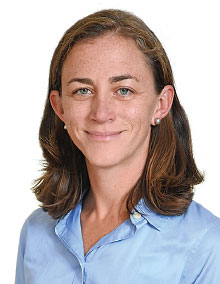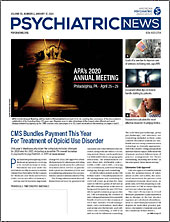Health professionals are missing opportunities to treat youth who have opioid use disorder (OUD), said Sarah M. Bagley, M.D., M.Sc., an assistant professor of medicine and pediatrics at Boston University School of Medicine, at the American Academy of Addiction Psychiatry’s 30th Annual Meeting and Scientific Sessions in San Diego last month.
“We did a study in Massachusetts of young adults who were in the emergency department after a nonfatal overdose. At 12 months we found that only 1 in 3 received medication treatment in that time,” Bagley told a packed house. “After a nonfatal overdose, they are at risk of a fatal overdose, and we are not treating them.”
Although the most recent National Survey on Drug Use and Health reported a decline in prescription opioid pain reliever misuse among youth and the general population, a deeper dive into the literature reveals news that is not quite so good, said Bagley, who is also medical director of the CATALYST Program. The program provides integrated medical and behavioral health care for adolescents and young adults who use substances.
“Among 15- to 19-year-olds, opioid poisonings have increased nearly threefold. Pediatric ICU admissions [for opioids] doubled between 2004 and 2015,” Bagley said, adding that fentanyl and other synthetic opioids are driving overdose death rates.
Bagley said that even though data suggest that medication treatment improves outcomes in young people overall, only 1 in 4 youth diagnosed with OUD received it between 2000 and 2014. She said that although this is largely because most health professionals who have the authority to prescribe buprenorphine for OUD treat adults, stigma may also keep youth from treatment. Bagley noted that stigma “plays out differently” in youth because they are influenced by their peers and family in ways that adults are not.
But in a troubling irony, youth also experience stigma from health professionals who question the legitimacy of medication treatment, Bagley said. She questioned whether addiction professionals who provide medication treatment should prepare young adults for resistance from other professionals.
“For other conditions, we don’t warn them of pushback. Is that something we should do?” she asked. “Should we warn them, like ‘Your pharmacist might push back or your other treatment providers may say ‘You are on what?’ What’s the framing when we start a young person on medication treatment?”
Bagley recommended three strategies to connect more youth with medication treatment: increase buprenorphine training and credentialing among health providers who treat adolescents, educate health professionals and the public about the stigma around medication treatment, and create innovative models of care. ■
The National Survey on Drug Use and Health is posted
here.

